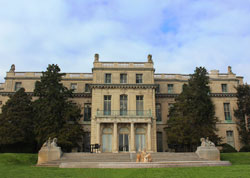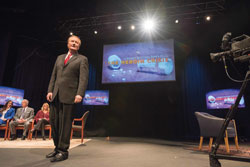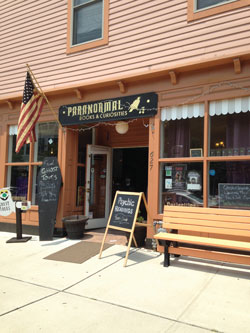A panel discussion was held on Feb. 17 to discuss Woodrow Wilson’s impact on the University in regard to the potential name change of Wilson Hall.
The panel consisted of Dr. Williams, Dr. Joseph Patten, Dr. Christopher Derosa, Dr. Richard Veit and Dr. Walter Greason. Each professor explained their area of expertise about Woodrow Wilson and then opened up the floor to discussion amongst students.
The panelists were asked what they thought should happen to Wilson Hall should it be renamed.
Greason said that Wilson Hall is “not the best name for what’s going on in the building. This building is a better place for a dormitory, academic building. Celebrate his legacy in a different building, this building is our school’s identity.”
Derosa agreed that the name change is a good thing. “Not out of morality, I want us to feel like we can [change the name] because we wanted to do something positive.”
Dr. Stephen Chapman, assistant professor of political science and sociology, was not on the panel but offered some insight on the topic, “…I do appreciate what the campus is doing in order to make the renaming possible. It’s these discussions that make a campus one that is quintessential to the power of choice, which it exactly how each individual should feel on campus.”
Wilson Hall is currently undergoing discussion because in the beginning of last fall the flags went up amongst several campuses with various figureheads coming into question. The issue is in regards to the history if Woodrow Wilson it is appropriate to name the hall after him. President Paul Brown said that conversations are taking place at Yale University, Georgetown, Harvard, Amherst, Oxford University, and the University of Maryland. “The issue of Woodrow Wilson’s legacy, in particular, is the subject of vigorous discussion underway at Princeton University,” he said.
Among being President of the United States, Wilson was a Nobel Prize recipient, president of Princeton University, and governor of New Jersey. Brown posed a possible problem. Wilson’s “many views on race are troubling, especially from the perspective of the 21stCentury, and especially at a university dedicated to affirming the worth of every person. These competing legacies are why we began the conversations, and the process, to arrive at a balancedperspective.
The renaming has been up for debate since September with no definite verdict of what’s going to happen. President Brown explained, “In the case of Woodrow Wilson Hall, which was named as such by the Board of Trustees in 1966, a formal act by the Board is required if a decision is made to alter the current designation.”
Senior political science student, Nicholas VanDaley, said, “I agree with, that Wilson being a known racist, I think we owe it to our students of color as well as our own message to rename the hall.” Two Monmouth students added, “When looking at history we need to consider the context within which it occurred. By modern standards, the views & beliefs that Wilson held towards other races were not acceptable. He would be shunned and ridiculed for them today, and rightfully so. But within that time period, they were acceptable. Thus it is not fair to judge him by today’s standards, as he did not exist in a world where those standards existed.”
“By removing his name from the building, it would set a precedent where almost every single major figure in history is up for judgment due to having beliefs/views that don’t align with modern standards. So then what do we do with them? Are we going to remove them too? We can’t just wipe away history like that.”
Matt Kiamie said, “It’s a part of U.S. history. It should be called Wilson Hall. A classroom of seniors met up to discuss the current topic and the feedback was that racism was more common in that period of time…We don’t want the name to change we, are for the name staying the same. Yes he may have been a racist but for that time period everyone was racist. We can’t hold him accountable for a norm that isn’t the 21st century’s definition of racist. The name Wilson hall should stay.”
PHOTO TAKEN by Kiera Lanni




